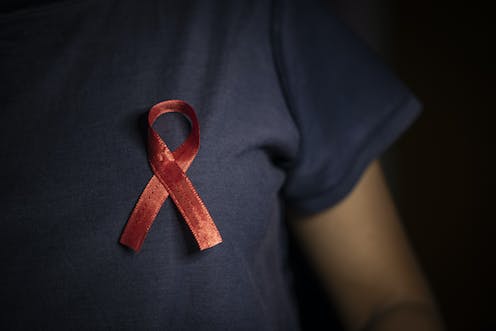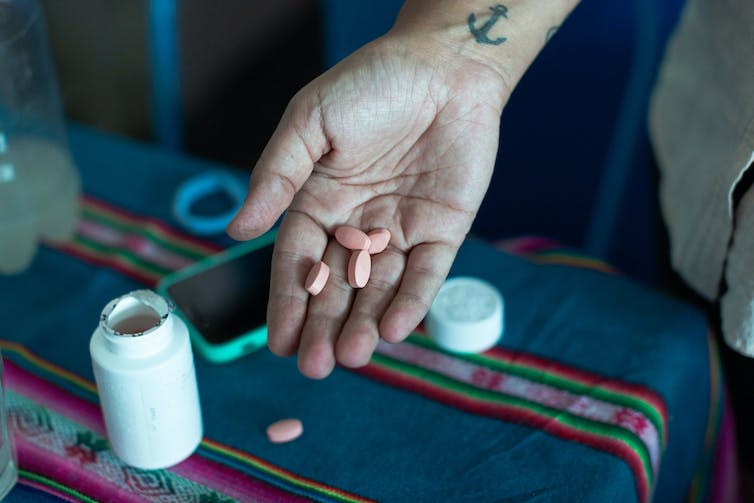
As the globe marks another World AIDS Day on Dec. 1, it’s crucial to both acknowledge the significant strides made in the global battle against HIV and recognize the persistent challenges that remain. While the United States had seen a slow decline in the overall number of new HIV infections from 2017 to 2021, a closer look at the data reveals persistent disparities largely borne by LGBTQ people and communities of color.
As a social epidemiologist who proudly identifies as a gay Latino, I have a vested interest both personally and professionally in understanding and addressing the HIV disparities my communities face. It’s disheartening to realize that, despite available medical advances that can end the AIDS epidemic, these resources aren’t reaching those who need them the most.
Table of Contents
Tools in the HIV prevention arsenal
When HIV/AIDS first emerged in the U.S. in the 1980s, condoms were the only prevention strategy available other than behavioral changes like abstinence. Since then, the development of effective medications has made it possible to live with HIV.
In the 1990s, researchers adopted the model of “treatment as prevention,” which recognized that an HIV-positive person with a reduced viral load from taking their antiviral therapy medications had a lower likelihood of passing the virus to their sexual partners. This messaging was changed in recent years to “undetectable = untransmittable,” or U=U, when a landmark study concluded that people living with HIV who are virally suppressed, or undetectable, through medications are not able to pass the virus on to a sexual partner.
In 2005, researchers introduced non-occupational postexposure prophylaxis, or nPEP, which aimed to prevent infection in someone exposed to HIV by initiating antiviral therapy.
In 2012, the U.S. Food and Drug Administration approved the first preexposure prophylaxis, or PrEP drug, which is an antiviral therapy that someone who has not been exposed to HIV takes daily to prevent infection. In 2021, the FDA approved the use of a long-acting, injectable form of PrEP, providing an alternative to daily pills.
While medical advancements have enhanced the options to prevent HIV, many aren’t reaching the people they are intended to treat. Of the estimated 1.2 million people eligible for PrEP in the U.S., only 30% received a prescription in 2021.
Racial disparities
Gay and bisexual men continue to comprise around two-thirds of new HIV infections in the U.S. Transgender people, people who inject drugs and sex workers also have disproportionate new infection rates. But cases are not distributed evenly by race.
The Centers for Disease Control and Prevention’s 2021 HIV Surveillance Report on groups at risk of HIV in 13 U.S. cities found that nearly 80% of gay and bisexual men engaged in condomless anal sex, with higher rates among white men than among both Black and Latino men.
However, between 2015 and 2019, white gay and bisexual men experienced a 17% decrease in HIV cases. Black and Latino gay and bisexual men experienced no significant reductions. This is likely due to disparities in access to HIV prevention medication. Among those who were HIV negative, only a little over 40% had used PrEP in the past 12 months, with white men reporting higher use than both Black and Latino men. Among those who were HIV positive, 95% were actively using antiviral therapy, and there was little variation by race.

Sara Jurado/E+ via Getty Images
Factors such as stigma, lack of access to and mistrust in health care, socioeconomic status, and cultural nuances that restrict access to PrEP likely contribute to the unchanging HIV burden Black and Latino men, trans people and people experiencing homelessness face.
Closing the PrEP access gap
A recent systematic review of 42 different interventions to promote PrEP among gay and bisexual men in the U.S. found that the most promising involve addressing various social and environmental factors that restrict access and adherence.
Tackling access barriers at the community and health care levels can enhance public health initiatives to expand PrEP access, including addressing issues like stigma and medical mistrust. This can help effectively promote PrEP use among Black and Latino gay and bisexual men and reduce racial disparities in HIV infections.
It is also important to note that while HIV disproportionately affects certain groups, people having heterosexual sex are still at risk and need to be part of the HIV prevention solution.
World AIDS Day serves as a poignant reminder that the fight against HIV is not only a global endeavor but also one that requires a nuanced understanding of the unique challenges different communities face. Addressing disparities and tailoring interventions can help move humanity closer to a world where HIV is no longer a pervasive threat.
![]()
Angel Algarin receives funding from the National Institutes of Health.























